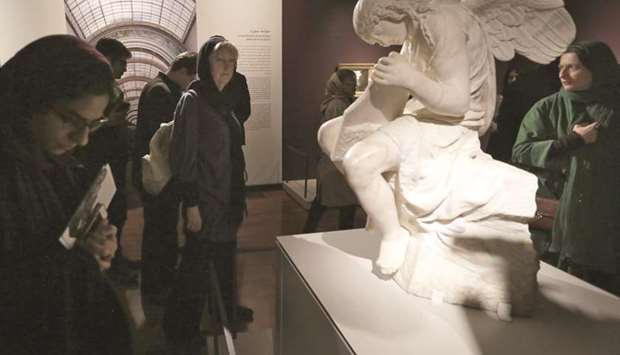“It was great. I never thought I’d see such artworks in my life,” said Mehdi, a 26-year-old student.
The exhibition certainly appeared to go down better than Monday’s visit by French Foreign Minister Jean-Yves Le Drian, who faced a day of tense discussions with Iranian officials before inaugurating the Louvre show.
The ever-combative Kayhan newspaper summed up the view of Le Drian’s visit with the headline: “Impudent guest gets a dressing-down”.
Le Drian has angered Iran’s leaders with his stern criticism of their missile programme and foreign interventions. “It was a tough trip, without concessions,” he told reporters on the way back to Paris late Monday.
The Louvre show returns the focus to the more positive aspects of France’s relations with Iran, which include the rebuilding of trade ties through deals involving companies such as Peugeot, Renault and Total since world powers signed a 2015 nuclear accord with Tehran.
It features a number of treasures from the Paris museum’s collection, including a 2,400-year-old Egyptian sphinx, a bust of Roman emperor Marcus Aurelius and drawings by Rembrandt and Delacroix. “It was very good, though I was hoping to see more Iranian pieces,” said Sorena, a young accountant. “But it was interesting and this sort of international co-operation is very good. Maybe it will lead to more economic relations with other countries.”
Only two small pieces from what is now Iran came over from the Louvre collection — an axe dating back more than 3,000 years and an even older mysterious bronze ornament from Lorestan featuring two bulls and a circle of men that became the logo of the Tehran Stock Exchange when it was launched in the 1960s.
“I know there are lots of valuable Iranian pieces in the Louvre, but this is a good start,” said Khashayar Tayar, a music teacher in his thirties.
“I’m really grateful to the organisers for this show. I hope future exhibitions will have more Iranian pieces to make me even happier.”
The exhibition marks the culmination of two years of work since a cultural exchange agreement was signed during a visit by President Hassan Rouhani to Paris in January 2016. France has deep cultural ties with pre-revolutionary Iran, and the National Museum itself was built by a Frenchman, Andre Godard, in 1938.
“In the tumultuous ocean of international relations, cultural diplomacy is a flare that we should maintain together,” Le Drian said at the ribbon-cutting ceremony on Monday night.

